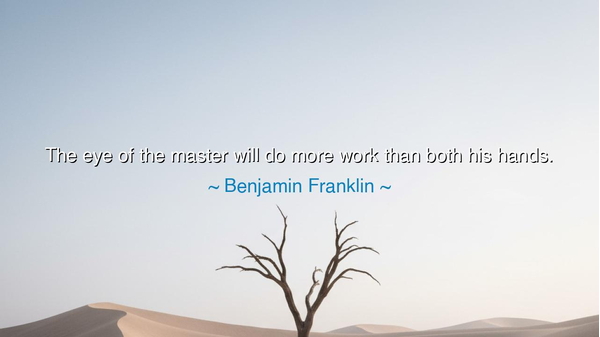
The eye of the master will do more work than both his hands.






The words of Benjamin Franklin, “The eye of the master will do more work than both his hands,” gleam with the wisdom of oversight and vigilance. He teaches that true power lies not only in labor itself, but in the guiding vision that directs it. The hands may toil, but without the discerning eye, their strength may be wasted. The watchful gaze of the master ensures that effort is rightly spent and that order and excellence prevail.
At the heart of this saying lies the truth that leadership is rooted in presence. A diligent eye, ever attentive, multiplies the value of labor by preventing error and neglect. Workers labor differently when they know they are seen; tasks are carried out with greater care under the gaze of responsibility. Thus, Franklin reminds us that a master’s watchfulness accomplishes what raw strength alone cannot—discipline, efficiency, and direction.
The origin of these words rests in Franklin’s practical wisdom, gathered from a life of invention, governance, and enterprise. Known for his proverbs in Poor Richard’s Almanack, he sought to guide men and women toward thrift, industry, and integrity. In this saying, he distilled the truth that oversight, attention, and accountability are the lifeblood of productivity. For Franklin, the eye was not merely vision, but the symbol of awareness and guidance.
Let this teaching endure: it is not enough to labor with hands alone; one must labor with mind and vision. The eye that observes, foresees, and corrects will multiply the fruits of all toil. A leader who watches with wisdom ensures not only that work is done, but that it is done rightly. Franklin’s words remind generations that mastery is not brute force, but the harmony of insight and action—a lesson as eternal as the rising of the sun.






NNtran thi ngoc nhu
This quote makes me think about the relationship between experience and efficiency. A seasoned leader can see potential problems or opportunities that others might miss, but is this insight the result of accumulated knowledge or just a more acute sense of awareness? How do we foster this kind of ‘eye’ in people who are still learning or don’t have the same experience? Can the ‘eye’ of a master truly be replicated or is it something that only comes with time?
VNVy Nguyen
Franklin's quote is powerful, especially when thinking about leadership in both small and large organizations. It suggests that the master’s awareness, insight, and judgment are vital for success, but how much of this wisdom can be passed down to others? Is there a way for a leader’s ‘eye’ to multiply through trust and mentoring, allowing others to see the work in the same way? Could a great leader not only guide but also empower others to lead?
UVPhuong Uyen Vu
I like the idea behind this quote, but it also raises a question—can too much oversight by the master lead to micromanagement? While observation is certainly important, how do we avoid the negative effects of being too involved? Could this ‘eye’ sometimes limit creativity or autonomy within a team? How do we strike the balance between directing the work and allowing others to have ownership of their tasks?
LLLy
This quote speaks to the power of leadership and the importance of being aware of every detail. But does this mean that a master should always oversee everything? Can too much supervision hinder the work of those beneath them? I’m curious if it’s better to trust your team and allow them to act independently or if keeping a close eye ensures higher standards and better results. How do we know when to step in and when to step back?
TTrang
Benjamin Franklin's quote suggests that leadership and careful observation are more powerful than just physical labor. It makes me wonder—how much can a leader’s vision and oversight influence outcomes, even if they aren’t directly involved in the hands-on work? Does this mean that having a clear direction and guiding others is more valuable than doing all the work yourself? How can leaders balance their role of guiding with the need to be involved in the process?